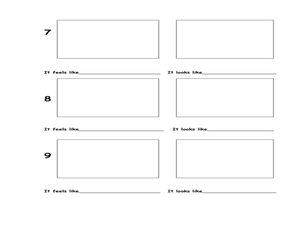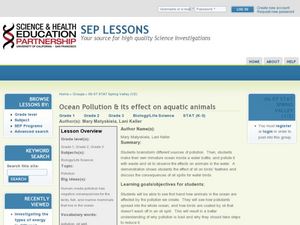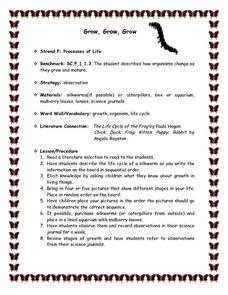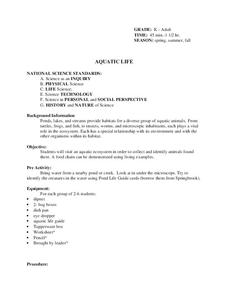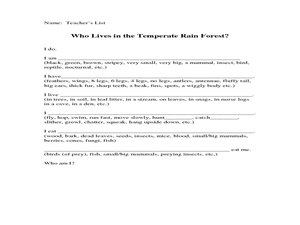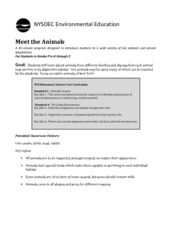Curated OER
The Life Cycle of the Butterfly
First graders, after listening to fictional and non-fictional literature about caterpillars, and observing caterpillars from egg to butterfly, write a "biography" of a caterpillar using appropriate vocabulary and time lines.
Curated OER
The Spider's Life Cycle
Students see that spiders have a life cycle, and reproduce by laying many eggs. We can count by ones, twos, fives, or as many as we want. They make two lists of animals on a chart.
Curated OER
Exploring Marine Objects
Students identify the sources of water on Earth. In this life science lesson, students list the different plants and animals that live in the ocean. They explore marine objects in the lab and draw them.
Curated OER
Life in a Log
Young scholars identify insects living in rotting logs. In this decomposition lesson, students observe pieces of a rotting log, they look at the insects that have inhabited the log and create a chart that shows their findings.
Curated OER
Ocean Pollution & its Effect on Aquatic Animals
Young scholars consider the concept of ocean pollution. In this ocean lesson, students participate in a hands-on demonstration in order to replicate an oil spill and its effects on marine life.
Curated OER
Grow, Grow, Grow
Students listen to literature selection, describe life cycle of silkworm, discuss what they know about growth in living things, observe silkworms for one week and record observations in science journals, and review stages of growth.
Curated OER
Aquatic Ecosystems
Students study the diversity of marine life and their habitats. For this aquatic ecosystems lesson students complete a lab activity and experiment.
Curated OER
Penguins Around the World
Students investigate penguins. In this Science lesson, students compare and contrast penguins to flying birds. Students use a Venn diagram to illustrate the differences and similarities of penguins and flying birds.
Curated OER
Life on the Surface of the Earth
Students discover that life occurs on or near the surface of the Earth in land, air, and water. They read the literature selection, 'Whose Forest Is It?'
and discuss with students that there are examples of of many living things
that...
Curated OER
PLANT LIFE CYCLES
Student learns about the life cycle of plants by watching a time-lapse video. This activity provides young scholars with further evidence that all living things grow and change as they progress through their life cycle. Student conducts...
Curated OER
Growing
Growing is part of being a living thing. Kindergartners decide which illustrations represent the life cycle of a living thing, then put a check mark next to the correct pictures. They then examine their own growth on a height chart.
Curated OER
Aquatic Life
Students explore aquatic life. In this science instructional activity, students visit an aquatic ecosystem and collect animals found there. Students create a food chain for the aquatic ecosystem.
Curated OER
RAINFOREST Mini-Unit
Learners engage in a variety of activities to investigate the subject of rainforests. The instructional activity focuses on the different floors of the rainforest and the types of life that exists on each.
Curated OER
PLANT LIFE CYCLES
Student learns about the life cycle of plants by watching a time-lapse video. This activity provides students with further evidence that all living things grow and change as they progress through their life cycle.
Curated OER
Layers of the Forest
Students explore rain forests. For this rain forest ecosystems lesson, students identify and describe the layers of the rain forest. Students paint and decorate a large rain forest mural. Students write riddles about animals that...
Curated OER
The Needs of Living Things
Learners watch video clips of animals and plants in their natural environment, to gather evidence that all living things have basic survival needs. Students draw pictures of real or imaginary pets eating, drinking, breathing, and taking...
Curated OER
Goldilocks and the Real Bears
Students participate in a comparison instructional activity where they compare fictional bears to real life bears. In this science/language arts instructional activity, students read Goldilocks and the Three...
Curated OER
Dinosaurs
Learners are introduced to the various types of dinosaurs and write in their journals about their favorite one. After listening to a story and watching a filmstrip, they color a few pages in their Dinosaur Friends Book. They also examine...
Curated OER
Meet the Animals
The class will examine a series of live or stuffed animals in order to learn how different animals survive in distinctive habitats. As they examine each animal, they will be asked a series of critical thinking questions geared at getting...
Curated OER
Marine Field Trip to Whytecliff Park
Pupils study the intertidal habitat, tidal pools and the organisms that live in them. In this aquatic ecosystems instructional activity students take a field trip and experience first hand the local seashore environment.
Curated OER
The Bear Necessities: A K-2 Computer Activity
Students demonstrate understanding of basic facts of polar bears based on their completed worksheets. They then demonstrate basic skill at scrolling on a Web page and identify key points in text.
Curated OER
Agriculture is a Cycle
What do a bicycle and the life cycle have in common? Cover this and more with the series of cross-curricular activities included in this plan. Learners do everything from making bracelets that represent the life cycle to checking out the...
Curated OER
Animal Homes
Students explore how an animal's relationship to its habitat affect the animal's survival. They discuss animal habitats and the animal's relationship to that habitat through the food chain, life cycle, community, and balance of nature....
Curated OER
Larva and Adult Antlion Body Parts
Students identify the major body segments of antlions. Through the use of diagram worksheets, students label the various body parts of the antlion. They review the life cycle of antlions from the larva stage to adult. Several activities...


